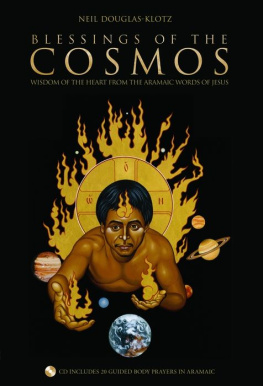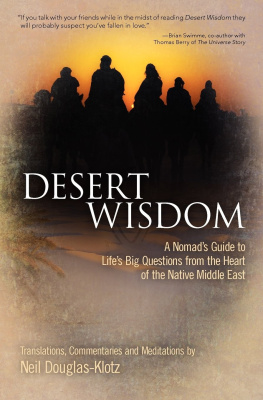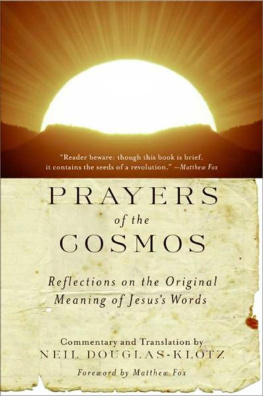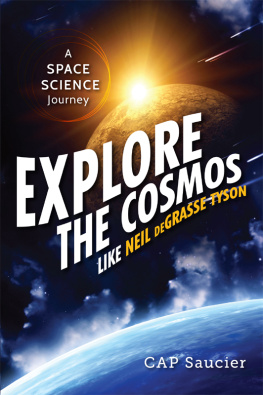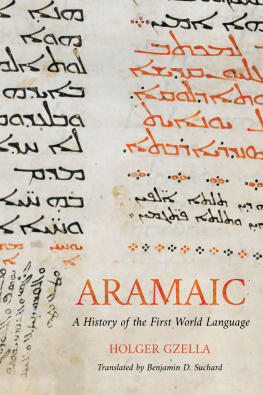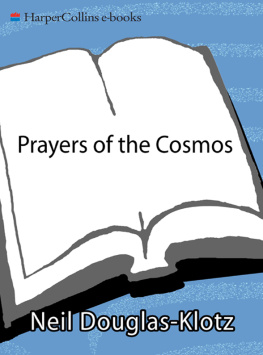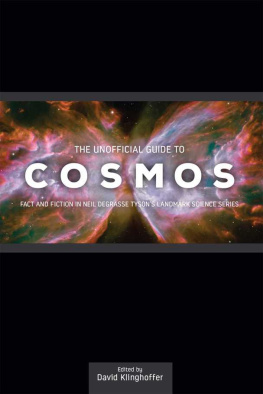Neil Douglas-Klotz - Blessings of the Cosmos: Wisdom of the Heart from the Aramaic Words of Jesus
Here you can read online Neil Douglas-Klotz - Blessings of the Cosmos: Wisdom of the Heart from the Aramaic Words of Jesus full text of the book (entire story) in english for free. Download pdf and epub, get meaning, cover and reviews about this ebook. year: 2006, publisher: Sounds True, genre: Religion. Description of the work, (preface) as well as reviews are available. Best literature library LitArk.com created for fans of good reading and offers a wide selection of genres:
Romance novel
Science fiction
Adventure
Detective
Science
History
Home and family
Prose
Art
Politics
Computer
Non-fiction
Religion
Business
Children
Humor
Choose a favorite category and find really read worthwhile books. Enjoy immersion in the world of imagination, feel the emotions of the characters or learn something new for yourself, make an fascinating discovery.
- Book:Blessings of the Cosmos: Wisdom of the Heart from the Aramaic Words of Jesus
- Author:
- Publisher:Sounds True
- Genre:
- Year:2006
- Rating:5 / 5
- Favourites:Add to favourites
- Your mark:
- 100
- 1
- 2
- 3
- 4
- 5
Blessings of the Cosmos: Wisdom of the Heart from the Aramaic Words of Jesus: summary, description and annotation
We offer to read an annotation, description, summary or preface (depends on what the author of the book "Blessings of the Cosmos: Wisdom of the Heart from the Aramaic Words of Jesus" wrote himself). If you haven't found the necessary information about the book — write in the comments, we will try to find it.
Blessings of the Cosmos: Wisdom of the Heart from the Aramaic Words of Jesus — read online for free the complete book (whole text) full work
Below is the text of the book, divided by pages. System saving the place of the last page read, allows you to conveniently read the book "Blessings of the Cosmos: Wisdom of the Heart from the Aramaic Words of Jesus" online for free, without having to search again every time where you left off. Put a bookmark, and you can go to the page where you finished reading at any time.
Font size:
Interval:
Bookmark:



TABLE OF CONTENTS
Sixteen years ago, I published the book Prayers of the Cosmos, an attempt to reinterpret and translate the Lords Prayer and the Beatitudes in the Gospel of Matthew from the standpoint of the Middle Eastern spirituality as found in Jesus native language of Aramaic. The approach was simple: because Aramaic, unlike Greek or English, allowed for a much greater range of meaning than a simple word-for-word translation could offer, I rendered each line of the prayer or Beatitudes five to seven different ways in poetic form. Surprisingly, the book is still in print and has sold more than a hundred thousand copies worldwide, mostly through word of mouth.
Using the same format, this book aims to present Jesus best-loved benedictions and words of encouragement in new translations derived from the Syriac Aramaic version of the Gospels called Peshitta, the same source I used for the original collection. Blessings of the Cosmos includes sayings like the great commandment on love (John 14), the Beatitudes reported in Luke, Jesus farewell talk with his disciples in John, and a number of other well-loved invocations of light, joy, peace, and faith. As readers have used my earlier book, they can also turn to this one for both personal inspiration and as a resource for communal worship and rites of passage.
In the sixteen years since Prayers was published, a great many developments in both the Christian theological and scholarly worlds have supported an Aramaic approach to the spirituality of Jesus.
On the side of Christian theology, many mainstream and liberal theologians have expressed the view that a majority of Christians are much more interested in spirituality, that is, religious experience, than they are in creeds or theological concepts. Those who find a friend in Jesus are much more interested in how he prayed and what he didspirituality and social justicethan they are in a catalog of beliefs about the virgin birth, the crucifixion, and the resurrection. They are less interested in what theologians call high christological concepts than they are in how each person can become a son or daughter of God, living in wisdom and compassion, as Jesus did. In this arena, my own work has also received much wider acceptance, and I have been invited to speak at many theological schools and churches on the spirituality of Jesus as viewed through his native Aramaic language and culture.
In the scholarly world, a number of developments have radically shifted the view of Jesus and his times. First, several other scholars have published research maintaining that no person can be labeled a Jew or a Christian either during the lifetime of Jesus or for up to 300 years thereafter. One Christian scholar stated simply, There are no Jews or Christians in the Bible (Pilch 1998). The Jewish scholar Daniel Boyarin has proposed in his most recent work (2004) that what we presently call Judaism and Christianity both emerged from an enmeshed hybrid identity that lasted for hundreds of years. Neither faith fully individuated from this twinned state until the time of Constantine, three centuries after Jesus, when the first Christian creeds were written as a charter for the now-Christian Roman Empire.
The word usually translated Jew in the Gospels is a mistranslation of both the Aramaic and Greek words that should read Judean, a person living in the geographical region of Judea (that is, not a member of an organized Jewish faith, which did not exist at the time). This tragic mistranslation puts in perspective 1500 years of blaming all Jewish people for the crucifixion of Jesus. From a broader perspective, this insight means that the most sensible context in which to view both Jesus historical career as well as his reported sayings is one that could be best be termed Jewish-Christian, late Hebrew, or proto-Jewish-Christian, in other words, a context of native Aramaic language, culture, cosmology, and psychology.
This has been bad news for much biblical scholarship of the past generation, which founded its (often fixed) views of the formation of the Gospels and of the historical Jesus himself on a largely unchallenged theory of a very early, clear division between the Jewish and Christian communities. The main justification for this view seems to have been something along the lines of, Of course, the two faiths must have been separate just after Jesus, because they are separate now. And anyway the Jews killed Jesus. The fact that this theory has turned out to be nothing more than a scholarly fantasy means that we must consider the possible sayings of Jesus not from the perspective of a much later, fully developed, Greek-language-based theology, one that had already created an orthodoxy for something called Christianity, but rather from within an Aramaic-language-based, largely Semitic, cosmology and psychology.
During the intervening years, other scholars and I have published articles and papers on this theme (see the bibliography). This research has communicated the message that much previous scholarship on Jesus has been based on epistemologies (that is, ways of knowing) that would have been foreign both to Jesus himself as well as to those communities that compiled all the early Gospels. Simply put, the various Gospels may select different sayings or stories of Jesus; however, viewed through an Aramaic or Semitic lens, one can see the same Jesus or at least a similar Jesus. For instance, as I pointed out in my fourth book, The Genesis Meditations, the Jesus in the Gospel of John and the Jesus in the Gospel of Thomas have a clear relationship to each other. Using the philosopher Wittgensteins dictum, the many different historical Jesuses posited by biblical studies scholars over the past two generations may be nothing more than chimeras based on a language problem.
The simple message that brings together both scholarly historical Jesus research and Christian theology is that when or if Jesus said anything, he said it in Aramaic. In my second book on this subject, The Hidden Gospel, I considered in-depth the ten most important Aramaic words and Semitic concepts used by Jesus. With these keys, readers could begin to decipher whatever version of the Gospels they were using and decode Jesus spirituality and spiritual practice. Following that, in The Genesis Meditations, I looked at the so-called apocalyptic sayings of Jesusthose predicting the end timesand found, from an Aramaic standpoint, not an obsession with endings but with creative beginnings. Jesus experience was not apocalypse now! but rather genesis now!
Throughout this whole period, I was collecting requests for translations from readers and also compiling my favorite words of encouragement and blessing from Yeshua. Life often presents so many challenges, difficulties, and heartaches. Yeshua seemed to know and understand this. He lived a simple life and was able to empathize with the often confused and distraught feelings of those who sat with him: feelings of being rootless, homeless, without direction or purpose, unwell, disconnected from ones Self or others. His healing words are miracles of psychology in themselves, but beyond this they carry the magnetism and atmosphere of his own connection to the Source of All, the creating, nurturing parent of the cosmos he often called
Font size:
Interval:
Bookmark:
Similar books «Blessings of the Cosmos: Wisdom of the Heart from the Aramaic Words of Jesus»
Look at similar books to Blessings of the Cosmos: Wisdom of the Heart from the Aramaic Words of Jesus. We have selected literature similar in name and meaning in the hope of providing readers with more options to find new, interesting, not yet read works.
Discussion, reviews of the book Blessings of the Cosmos: Wisdom of the Heart from the Aramaic Words of Jesus and just readers' own opinions. Leave your comments, write what you think about the work, its meaning or the main characters. Specify what exactly you liked and what you didn't like, and why you think so.

